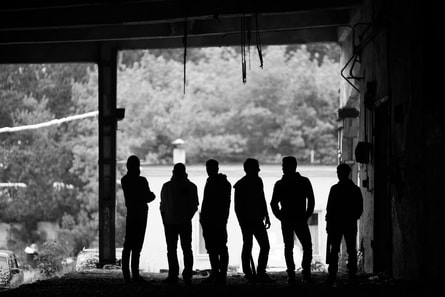Serious Youth and Group Violence Training
Recognising and Responding to the Needs of Serious Group Violence

Working with gangs and Serious Violence is a complex issue; there are no quick fixes, no number of services which can afford to work in isolation. The benefit of your intervention depends on the awareness, skills and experience of your staff. SMART Training and Consultancy can work with you to improve all three areas through training and ongoing consultancy services.
So far SMART Training and Consultancy has delivered training to police officers, judges, teachers, council staff, youth workers, nurses, probation officers and prison staff on working with young people involved in gang activity, serious youth violence and anti-social behaviour. The feedback we receive continually demonstrates that practitioners who have been on our training have been able to improve their practice and better effectively respond to the needs of the young people they work with.
Delivered by trainers with first-hand experience of the criminal justice system and negative lifestyle choices, They not only speak from experience, but are also able to relate findings from research and academic studies.
No glamourising, no nonsense, just a solid practical focus on what is known to work!
So far SMART Training and Consultancy has delivered training to police officers, judges, teachers, council staff, youth workers, nurses, probation officers and prison staff on working with young people involved in gang activity, serious youth violence and anti-social behaviour. The feedback we receive continually demonstrates that practitioners who have been on our training have been able to improve their practice and better effectively respond to the needs of the young people they work with.
Delivered by trainers with first-hand experience of the criminal justice system and negative lifestyle choices, They not only speak from experience, but are also able to relate findings from research and academic studies.
No glamourising, no nonsense, just a solid practical focus on what is known to work!
Webinar Training
These are unprecedented times. COVID-19 is a deadly virus that took hundreds of lives a day. The impact on society as a whole has been devastating; people have lost their lives, their jobs, their mental well-being. Arguably nowhere has been hit hardest than the marginalised and vulnerable who were already suffering. Owing to the enormous amount of requests by practitioners and organisations a new set of courses have been developed specifically for those who can only attend training remotely.
There is a brand new format to these sessions and it has been built with the aim of keeping it informative but at the same time as interactive as possible. Following the recommendations put forward by our learners the training sessions are limited to half days only and the learning outcomes are chosen by you the learner so it makes good sense to have in mind what your needs are before getting in touch. Finally the topics are not exhaustive, new topics can be covered / created upon request.
There is a brand new format to these sessions and it has been built with the aim of keeping it informative but at the same time as interactive as possible. Following the recommendations put forward by our learners the training sessions are limited to half days only and the learning outcomes are chosen by you the learner so it makes good sense to have in mind what your needs are before getting in touch. Finally the topics are not exhaustive, new topics can be covered / created upon request.
Webinar Training - CCE, Gangs and Serious Group Violence: Supporting and responding to Vulnerable People at Risk
Usual course length: 1-2 half days
As a result of the training, you will:
All employees or 'Front Line' practitioners who deal with those 'at risk' of gang involvement or Serious Youth or Group Violence
Get in touch with us to discuss your needs and get your quote
As a result of the training, you will:
- Have an improved understanding of CCE, County Lines, gangs and serious group violence
- Be able to identify the signs and reasons why young people may affiliate or become groomed by exploitation groups such as gangs
- Understand the reality of gangs serious youth violence and the media
- Learn what is meant by County Lines and the context of how they operate
- Explore the role of girls and how they become involved in CCE, gangs and exploitation
- Be able to identify the earliest stages whether a young person is involved in CCE, gangs and serious violence
- Understand the various ways groups entrap and exploit vulnerable groups for example through debt bondage, through violence, through coercion
- Explain the realities & consequences of CCE.and the impact on the individual, their family, their future and the community
- Have increased awareness of the role of social media in relation to CCE, Gangs and Group Violence and of the different platforms that exist.
- Be able to understand the grooming line and implement the 4 pillars of intervention
- Explore the reality of debt bondage and what how to support those involved and their families
- Be able to identify ways of working in partnership to facilitate group exit safely
- Understand the various challenges and barriers to supporting vulnerable groups at risk of exploitation.
- Use reflective practice to understand your own traps; your own barriers to getting better outcomes
- Be able to recognise the impact that COVID-19 has had on marginalised/vulnerable groups
- Learn from experts with first-hand experience
All employees or 'Front Line' practitioners who deal with those 'at risk' of gang involvement or Serious Youth or Group Violence
Get in touch with us to discuss your needs and get your quote
CCE, Gangs and Serious Group Violence: Understanding, Supporting and responding to Vulnerable People at Risk

Usual course length: 1-2 (full days)
As a result of the training, you will:
Courses can be tailor-made to include the following elements:
All employees or 'Front Line' practitioners who deal with those 'at risk' of gang involvement or Serious Youth or Group Violence
Get in touch with us to discuss your needs and get your quote
As a result of the training, you will:
- Have an improved understanding of gangs and serious youth violence
- Identify the reasons young people affiliate with gangs
- Understand the reality of gangs serious youth violence and the media
- Be able to identify at the earliest stages possible whether a young person is involved in gangs and serious violence
- Understand the issues around girls and gangs, including grooming and sexual exploitation
- Learn what is meant by County Lines and how they operate
- Be able to identify ways of working in partnership to facilitate group exit safely
- Learn from experts with first-hand experience
Courses can be tailor-made to include the following elements:
- The structures of different types of gangs and organised criminal networks
- Recognising the warning signs and behaviour of young people that are involved in gangs.
- Why and how people get involved in gangs, and the different models of grooming and exploitation that exist
- County Lines - what they are, how they work and what to look out for and what is required to break them down
- The exploitation of girls, and the experience of female gang members
- Warning signs that young people are becoming involved with gangs
- Making interventions and examining the appropriateness of participants’ policies and procedures
- Accessing specialist support and resources
- Understanding how group affiliations work and how this influences a young person’s decision making.
- Understanding how to break gang links and replace feelings of solidarity and gang membership with something else.
- How to work with young people pro-actively and take appropriate action to reduce offending and absconding.
- A breakdown of the skills needed to divert young people with gang affiliations to more appropriate activities and to develop a sense of belonging.
- Building strategies for supporting gang exit.
- Different types of intervention which can hinder and disrupt group activity
- Explore the role of social media in terms of being a medium which can promote, groom and incite group activity and violence
- Be able to understand the grooming line and implement the 4 pillars of intervention
- Explore the reality of debt bondage and what how to support those involved and their families
- Understand the victim/offender overlap
- What motivational tools are best for practitioners to use?
- Learning from mistakes of the past
All employees or 'Front Line' practitioners who deal with those 'at risk' of gang involvement or Serious Youth or Group Violence
Get in touch with us to discuss your needs and get your quote
CCE, Gangs and Serious Group Violence: Understanding, Supporting and Responding to Vulnerable People at Risk - Foster Carers / Guardians Training

Usual course length: 1-2 half days
As a result of the training, you will:
Recommended for:
Foster Carers, Parents, Families, Caregivers, Teachers, Schools and other organisations working with these networks
Get in touch with us to discuss your needs and get your quote
As a result of the training, you will:
- Have an improved understanding of what gangs and serious youth violence is and of the different types
- Have a greater appreciation of the differences between anti-social and street gang-related behaviours.
- Be able to Identify the reasons young people affiliate with gangs
- Have increased knowledge of the grooming/coercion of Looked-After Children and how professionals can protect this vulnerable group.
- Understand the reality of gangs and serious group and their relationship with social media
- Be able to identify at the earliest stages possible whether a young person is involved in gangs and serious violence
- Understand the issues around girls and gangs, including grooming and sexual exploitation
- Understand what is meant by County Lines and how they operate
- Know how to position yourself differently so that it is more likely that a young person comes to you for support
- Be able to identify ways of working in partnership to support the young people in your care to exit safely
- Learn from experts with first-hand experience
- Have had opportunity to build a supportive network with other parents, guardians and caregivers
Recommended for:
Foster Carers, Parents, Families, Caregivers, Teachers, Schools and other organisations working with these networks
Get in touch with us to discuss your needs and get your quote
